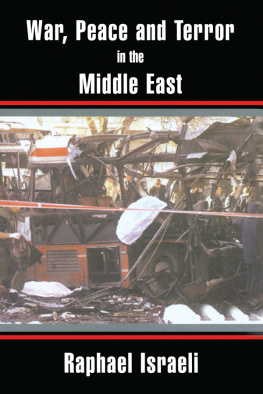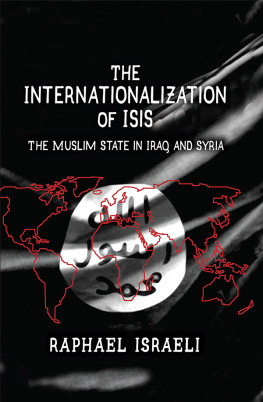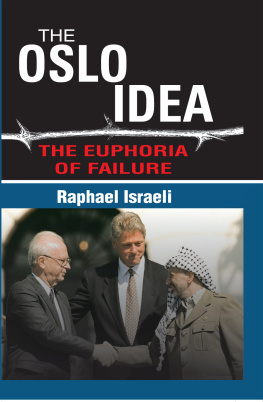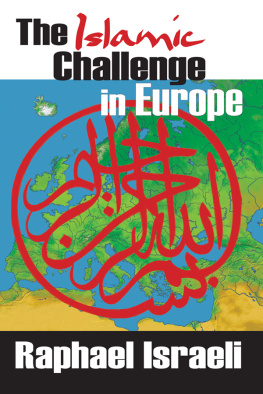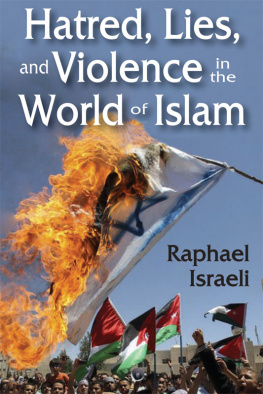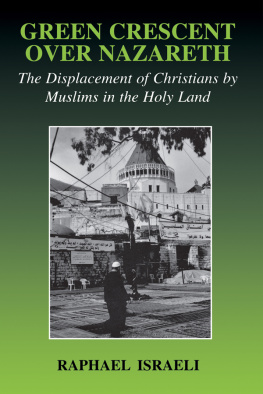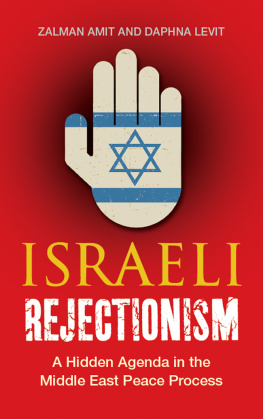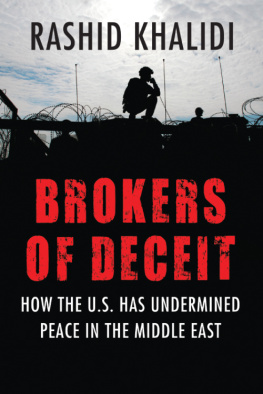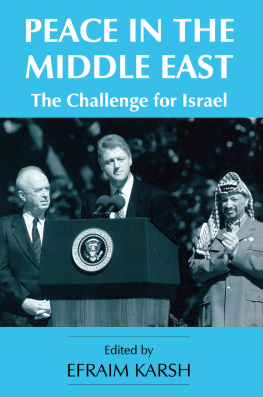WAR, PEACE AND TERROR IN THE MIDDLE EAST
BOOKS OF RELATED INTEREST
Aviation Terrorism and Security, rev. edn
Paul Wilkinson and Brian M. Jenkins (eds)
Fundamentalism and Intellectuals in Egypt, 19731993
David Sagiv
Inside Terrorist Organizations
David C. Rapaport
International Security in a Global Age: Securing the Twenty-First Century
Clive Jones and Caroline Kennedy-Pipe
Military Studies in the Jihad Against the Tyrant: The Al-Qaeda Training Manual
Jerrold M. Post (ed.)
Religious Radicalism in the Greater Middle East
Bruce Maddy-Weitzman and Efraim Inbar (eds)
Science, War and Terrorism: From Laboratory to Open Conflict
Jacques Richardson
The State of Knowledge of the Islamic Phenomena in the Middle East and North Africa: A Stocktaking Exercise
B.A. Roberson (ed.)
Terrorism and Grand Strategy
Paul B. Rich and Thomas R. Mockaitis
Terrorism Today
Christopher C. Harmon
Twenty-First Century Weapons Proliferation
Henry Sokolski and Jim Ludes (eds)
Violence and the Sacred in the Modern World
Mark Juergensmeyer (ed.)
War, Peace and Terror in the Middle East
Raphael Israeli
First Published in 2003 by
FRANK CASS & CO. LTD.
This edition published 2013 by Routledge
2 Park Square, Milton Park, Abingdon, Oxon, OX14 4RN
711 Third Avenue, New York, NY 10017
Routledge is an imprint of the Taylor & Francis Group, an informa business
Copyright 2003 Raphael Israeli
British Library Cataloguing in Publication Data:
Israeli, Raphael
War, peace and terror in the Middle East
1. ArabIsraeli conflict 1993 2. ArabIsraeli conflict 1993 Peace 3. Islam and terrorism 4. Middle East History 1979
I. Title
956.05
ISBN 978-0-7146-5531-4 (hbk)
Library of Congress Cataloging-in-Publication Data:
Israeli, Raphael.
War, peace and terror in the Middle East / Raphael Israeli.
p. cm.
Includes bibliographical references (p.) and index.
ISBN 0-7146-5531-7 (hbk)
1. ArabIsraeli conflict 1993 Peace 2. Terrorism Middle East. I. Title.
DS119.76.I822 2003 |
956.053 dc21 | 2003048490 |
All rights reserved. No part of this publication may be reproduced, stored in or introduced into a retrieval system or transmitted in any form or by any means, electronic, mechanical photocopying, recording or otherwise, without the prior written permission of the publisher of this book.
To my son, David
who taught his elders
compassion, humility and humanity
This book is a collection of articles written by the author, and for the most part published over the past few years, which are concerned with the fateful issues of war and peace in the Middle East; especially that evasive brand of war terrorism and incitement that usually escapes definition, but nonetheless has contributed greatly to the rising in the level of violence in that volatile area of the world.
Indeed, horrific words of incitement, followed by atrocious acts of terror, have occurred during the past few years and significantly eroded the hopes inherent in the peace process that had been initiated by Sadat and Begin a quarter of a century ago (1977) and driven it to an impasse. In fact, all the efforts to duplicate that feat between Israel and Palestinians have ended in frustration thus far, and it now seems that not only are we back to square one, but that a tremendous amount of ground work will have to be done before the situation is ripe again for a peace venture.
Though the Palestinian issue has been central to this set-back, it is nevertheless noteworthy that much of it has been fed, fomented and cultivated by rejectionists such as Saddam Husseins Iraq and the Assads (father and son) Syria; by the augmented and direct help of world Islamic terrorism; and, yes, even by Mubaraks Egypt, which has its own axe to grind in this issue. It is no coincidence that Palestinian recalcitrance and the outbreak of the Intifadah (2000) which resulted in the undoing of the peace process came on the heels of the Israeli withdrawal from Lebanon, which encouraged the Hamas and their peers to follow the Iran-sponsored Hizbullah model of fighting Israel into submission; or that the incitement to further violence, led by the Palestinian Authority, has been based on these themes; or that the current Islamic wave of terrorism worldwide has found strong and supportive echoes in the Palestinian street.
This collection of essays will focus on some of these themes with both the benefit of hindsight gained since the following articles were published, and the insight that the current world crisis has been occasioned by the terrorism and broadsides against Western culture which al-Qaida and its allies have launched. It is widely understood and believed that, in the wake of the present American campaign against terrorism, in which Muslim fundamentalists play the major role, but which some major Muslim countries may be willing to help quell, a new strategic thinking may emerge, which might reshuffle allegiances and alliances and produce a new world order.
Jerusalem
December 2001
The Predicament and Its Terminology
When the horrendous act of terror at Oklahoma City unfolded before the incredulous eyes of Americans who could not comprehend why a fellow American could be so filled with hate and motivated by evil as to eliminate dozens of his innocent countrymen they sought solace in the law-enforcement system of the USA and its ability to bring the culprit to justice; but the whole horror and its ramifications did not transcend the American borders. Few looked for justifications for the crime, or understood the frustration of the criminal; deeming mass killing on this scale an out-of-the-ordinary and aberrant form of behavior worthy of unmitigated condemnation and contempt.
But when, on 11 September, the terrorist act of the millennium wrecked New York and Washington, America woke up to a new reality of panic and disarray, because the perpetrators were guided from the outside, and the American justice system could not investigate and lay its hands on them within the perimeters of its territory. Hence, the process of seeking justice beyond American borders immediately took on the form of a world-wide war, which instantly became the concern of all nations. At the same time, however precisely due to the international nature of this developing conflict justifications, apologetics and rationalizations were offered which forced the American administration to feel its way as it went along.
President Bush was, at first, committed to punish and bring to justice the perpetrators; then he declared a crusade against terror and against its heads who were wanted, live or dead; then he gave the choice to all countries to either side with him or bear the onus of opposing him. And, finally, he resolved that terrorism had to be fought at its roots, and he prepared for an all-out war that disregarded collateral damage to civilians, and vowed to take it from one target to another until international terrorism was uprooted and defeated. While his initial reactions came from the hip and sounded more vindictive than rational, his later actions were more in line with a long-term determined and sustained policy of waging war and winning it.

